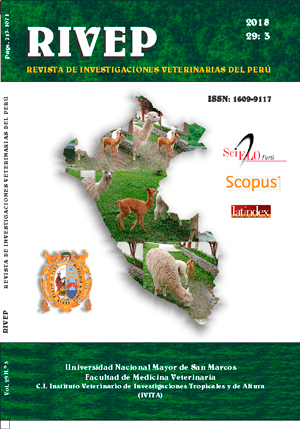Molecular detection of canine distemper virus in clinical cases from unvaccinated domestic dogs and assessment of risk factors
DOI:
https://doi.org/10.15381/rivep.v29i3.14744Keywords:
canine distemper, molecular detection, nucleoprotein, PCRAbstract
The canine distemper (CD) is a viral infection caused by a Morbillivirus of the family Paramyxoviridae. It can generate digestive, respiratory, and nervous symptomatology, depending on the infecting strain. This study was designed to detect the CD virus through the RT-PCR technique and perform the analysis of the data collected to have a current view of the behavior of this virus in Lima, Peru. Whole blood samples from 52 unvaccinated canines with clinical signs compatible with canine distemper were collected between June 2012 and January 2015. The nucleoprotein of 287 bp was successfully amplified in 32.7% (17/52) of the samples analyzed. In addition, it was found a greater detection of the virus, but not significative, in individuals that manifested systemic clinical signs (respiratory and digestive signs vs nervous) and within the age range of 1.5-4 months.Downloads
Downloads
Published
Issue
Section
License
Copyright (c) 2018 Andrea Soto R., Luis R. Luna E., Raúl Rosadio A., Lenin Maturrano H.

This work is licensed under a Creative Commons Attribution-NonCommercial-ShareAlike 4.0 International License.
AUTHORS RETAIN THEIR RIGHTS:
a. Authors retain their trade mark rights and patent, and also on any process or procedure described in the article.
b. Authors retain their right to share, copy, distribute, perform and publicly communicate their article (eg, to place their article in an institutional repository or publish it in a book), with an acknowledgment of its initial publication in the Revista de Investigaciones Veterinarias del Perú (RIVEP).
c. Authors retain theirs right to make a subsequent publication of their work, to use the article or any part thereof (eg a compilation of his papers, lecture notes, thesis, or a book), always indicating the source of publication (the originator of the work, journal, volume, number and date).



